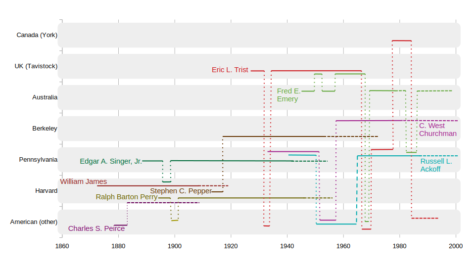EQ Lab runs Dialogic Drinks, “the kind of philosophical discussion you have in a coffee shop or bar”, twice per week. Wtih this group interested loosely in questions on leadership, I was invited to host an online session on March 12 (evening in Hong Kong and Singapore, really early in Toronto) and on March 14-15 (evening in Toronto, morning in Hong Kong and Singapore).
The majority of the organizational change approaches presume the “unfreeze-move-refreeze” metaphor attributed to Kurt Lewin. Taking a different approach has resulted in the converging of a comprehensive alternative with Systems Changes Learning, after 5 years of development.
These Dialogic Drinks sessions are weighted less on presentation, and more on discussions and reflections.
| A. Welcome |
Introduction |
:05 |
| Ice-breaker |
:05 |
| B. Rethinking Systems |
Presentation One |
:07 |
| Dialogue One |
:20 |
| Reflection One |
:10 |
| C. Rethinking Systems Changes |
Presentation Two |
:07 |
| Dialogue Two |
:20 |
| Reflection Two |
:10 |
| D.Rethinking Systems Changes Learning |
Presentation Three |
:07 |
| Dialogue Three |
:20 |
| Reflection Three |
:10 |
| E. After Hours |
|
:30 |
With a condensed schedule for presentations, the imagery of short movies can express ideas more readily than the vector lineart that I usually use. I recorded my voice (without the discussion of participants) and resynchonrized the slides and movies into a package. The result was about 36 minutes of presentation, while the full Dialogic Drinks sessions each ran for more than 2.5 hours.
This recording of the presentation segments is available on Youtube , as well as on the Internet Archive .… Read more (in a new tab)
EQ Lab runs Dialogic Drinks, “the kind of philosophical discussion you have in a coffee shop or bar”, twice per week. Wtih this group interested loosely in questions on leadership, I was invited to host an online session on March 12 (evening in Hong Kong and Singapore, really early in Toronto) and on March 14-15 (evening in Toronto, morning in Hong Kong and Singapore).
The majority of the organizational change approaches presume the “unfreeze-move-refreeze” metaphor attributed to Kurt Lewin. Taking a different approach has resulted in the converging of a comprehensive alternative with Systems Changes Learning, after 5 years of development.
These Dialogic Drinks sessions are weighted less on presentation, and more on discussions and reflections.
| A. Welcome |
Introduction |
:05 |
| Ice-breaker |
:05 |
| B. Rethinking Systems |
Presentation One |
:07 |
| Dialogue One |
:20 |
| Reflection One |
:10 |
| C. Rethinking Systems Changes |
Presentation Two |
:07 |
| Dialogue Two |
:20 |
| Reflection Two |
:10 |
| D.Rethinking Systems Changes Learning |
Presentation Three |
:07 |
| Dialogue Three |
:20 |
| Reflection Three |
:10 |
| E. After Hours |
|
:30 |
With a condensed schedule for presentations, the imagery of short movies can express ideas more readily than the vector lineart that I usually use. I recorded my voice (without the discussion of participants) and resynchonrized the slides and movies into a package. The result was about 36 minutes of presentation, while the full Dialogic Drinks sessions each ran for more than 2.5 hours.
This recording of the presentation segments is available on Youtube , as well as on the Internet Archive .… Read more (in a new tab)



